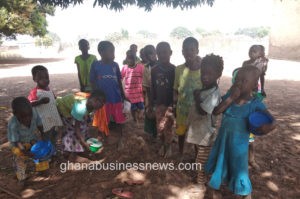Child poverty in Ghana: 73.4% are deprived – Report
 The Ghana Multidimensional Child Poverty Report, launched on Thursday in Accra, shows that children in Ghana experience significant deprivations in services and denial of their basic rights, and called for appropriate policy actions and investment in children.
The Ghana Multidimensional Child Poverty Report, launched on Thursday in Accra, shows that children in Ghana experience significant deprivations in services and denial of their basic rights, and called for appropriate policy actions and investment in children.
The Report indicated that nearly three out of every four children in Ghana (73.4%), are deprived in nutrition, health, learning, protection, water, sanitation, housing and information.
These children are deprived in at least three out of the eight dimensions.
There are, however, very few children, only 2.5 per cent, who are without any deprivation.
The Report, put together by the National Development Planning Commission (NDPC), the Ghana Statistical Service and the Ministry of Gender, Children and Social Protection, in collaboration with UNICEF, has therefore, recommended an increase in political will to prioritise child poverty issues at all levels through sensitisation campaigns.
The 107-page Report, among others, called for multi-sectoral approaches through coordinated policy responses that encouraged both the scaling up of specific sectoral interventions as well the provision of complementary services by relevant stakeholders.
It said specific groups of deprived children based on location and dimensional deprivation should be targeted, as well as making child poverty a priority budget issue to increase allocation of funds and expenditures on child poverty reduction.
It called for intensified public health education and campaigns on the importance of exclusive breastfeeding during the first six months of a child’s life while increasing community engagement and behavioural change campaigns to promote positive parental and caregiving attitudes and practices.
The Report said investment in the provision of affordable and quality early day care centres for working mothers, particularly women in the informal sector, must be prioritised to enable them to effectively combine their economic activities with child care responsibilities.
It said public investment towards the provision of low cost social housing must be increased for accessibility by poor and deprived households.
Household access to information and communications technology and services must be promoted through the establishment of community ICT centres, especially in rural and deprived areas.
Meanwhile, child poverty is measured using the dimensions of wellbeing that reflects the needs and rights of Ghanaian children, the Report indicated.
The First Lady, Mrs Rebecca Akufo-Addo, who delivered the keynote address at the launch of the Report, expressed the need to identify and implement interventions to contribute to the eventual eradication of child poverty.
“We need to break the cycle of inter-generational deprivation, and develop the capacity of children to make successful transition through to adulthood”, she said.
Every child deserved to have access to good nurturing, nutrition, health, education, water, sanitation and general well-being.
“These are all critical building blocks for child development, without which we cannot derive the expected dividend in our human development. We need to deal with inequality from its root,” she said.
Ms Anne-Claire Dufay, the UNICEF Country Representative, said the Report would be a useful source of data and evidence for advocacy and policy making, while serving as a good reference for many sectors of the economy to reduce child poverty in Ghana.
She said the country had shown much interest in achieving the Sustainable Development Goal 1, the target that sought to reduce multidimensional poverty by 2030 to 36.7 per cent, by launching the Report.
Source: GNA
